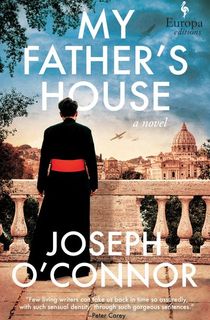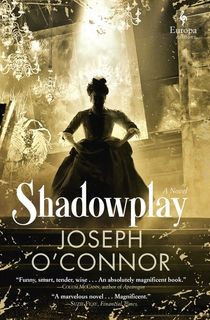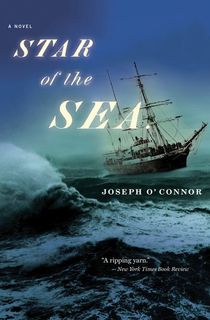Irish novelist Joseph O’Connor’s newest bestselling fiction book My Father’s House tells the remarkable true story of how Irish priest and Vatican official Hugh O’Flaherty created a network to help people escape the Nazis from Occupied Rome. It’s a game of cat and mouse as SS officer Paul Hauptmann is on his heels. Can the Choir, as the network is called, keep themselves out of Nazi hands while continuing to rescue prisoners of war, Jewish folks, and other people threatened by the Nazis? It’s a riveting story told from multiple viewpoints and time frames about the mission that will have you on your seat from page one to the last.
O’Connor has written 18 books of both fiction and nonfiction as well as screenplays and two short story collections. He’s won several awards including an American Library Association Award and the Irish Pen Award for Outstanding Achievement in Literature. He’s also a broadcaster working with many musicians and currently is the Frank McCourt Professor and Chair of Creative Writing at the University of Limerick.
Murder & Mayhem had the honor to chat with Joseph O’Connor via email about his newest work.

My Father's House
How did you decide to write this story of Monsignor Hugh O’Flaherty? When did you first hear about Hugh? I know it’s based on a true story.
I’m not positive as to when and where I first [heard] Hugh's story but I think it may well have been in the town of Listowel, County Kerry, in the southwest of Ireland, where there is an annual literary festival. I’ve been attending for thirty years. At some point, someone told me about a man from Kerry, Hugh O’Flaherty, a Catholic priest in the Vatican during World War Two, who saved thousands of people from the Nazis.
Why is this story important to tell?
It’s about courage in a dark time. Standing up for what’s right. Refusing to get pushed around by bullies. Or your friends. Knowing how to live in a world where too many political leaders are braggers and election deniers. Refusing to accept the lies of people who constantly insist on the differences between people, rather than the similarities. So, the more I break the story down into its elements, the more oddly familiar its world starts to feel.
.jpg?w=32)
Photo of Joseph O'Connor
Photo Credit: photo by Urszula SoltysWhile it is based on a true story so certain events have to happen, do you consider yourself a pantser (writing by the seat of your pants) or a plotter (outlines)?
I’m both. I write a fairly complete outline and draw it out on a sheet of A3, using a sort of schematic I’ve adapted from the Syd Field screenwriting paradigm, and I pin that to my office wall, but then I revise, reshape, mess around with it for a while. I'll draw maybe six versions, never throwing any of them away. When I have a shape that I feel can work with, I feel freer, and my chapters and sequences become more explorative. I’ll do that for a year or so, then write the final version.
Do you have a favorite character?
On different days I have different favorites. Today I am very fond of the beautiful and brave Contessa Giovana Landini. But yesterday it was sardonic, downbeat Johnny May. I always love the Rome that appears as, I guess, a sort of character in the book.

Shadowplay
I found it fascinating that you added the voice of SS Officer Paul Hauptmann who presents a real different perspective of the story. Could you talk about that choice?
Perhaps every story, and certainly every thriller needs to have tension. That's often embodied in one character, the adversary of the hero. That's why Hauptmann is in the book and why he's presented as real, with a voice, a life, a family, and so on. To raise the threat. If his background seems real to the reader, so will his ruthlessness seem real.

Star of the Sea
What made you decide to write this as a novel instead of a work of nonfiction?
It couldn't have been a work of nonfiction because so much of it is invented. The novel is, to my mind, such a fascinating and wonderful artform because it can take you into places where the historian has no business going. Indeed it must do that if it's going to work at all.
Can you tell me anything about the next two books since it’s posited as a trilogy? Do they stay with Hugh/The Choir or talk about someone else?
The next two books are about members of The Choir who appear in My Father’s House. The book I’m working on now, entitled The Operation, has the Contessa Landini as the main character, and the next one, called Legal Tender, will feature John May, jazz saxophonist and butler to the British ambassador in Rome.
What else do you want me to know that I haven’t asked above?
There’s a lot of music in My Father’s House, as there will be in the next two novels also. This is because the characters in the books are always trying to work collaboratively for the Escape Line, and I think the greatest things we do are all collaborative in nature. Especially music. Even a solo performer is working in collaboration, with the people who came beforehand in that musical tradition, like in folk or blues, or the people who built the instrument, as in classical. And of course, all musicians are working with that most important collaborator, the listener. To me, words are sounds before they are anything else. The novelist writes the sheet music but it’s the reader who sings the song.
